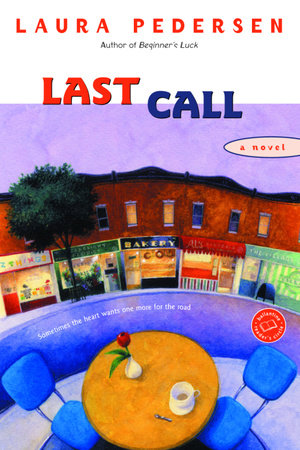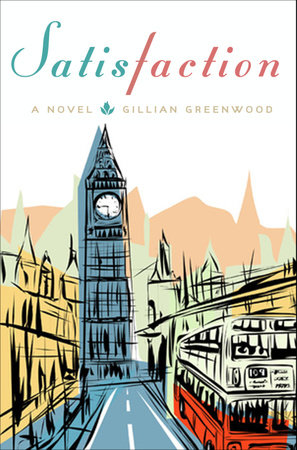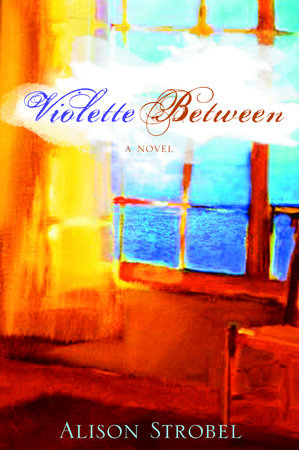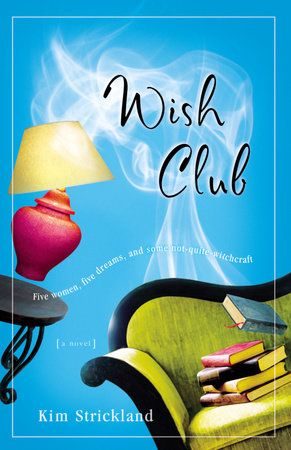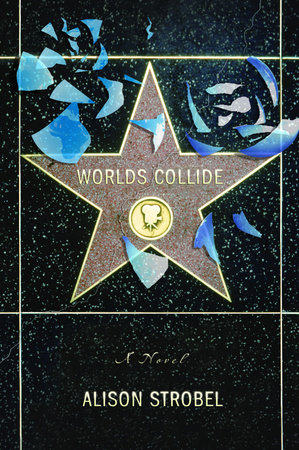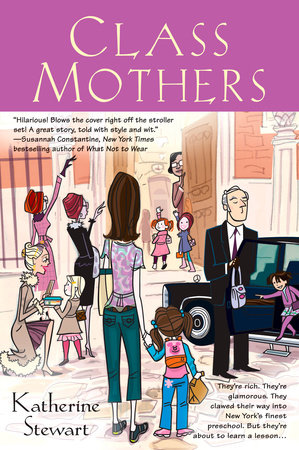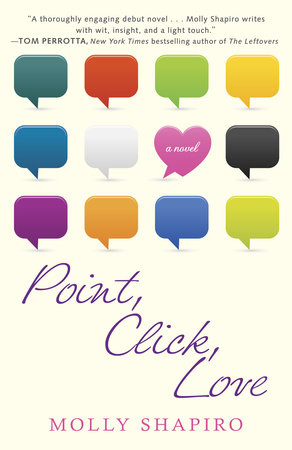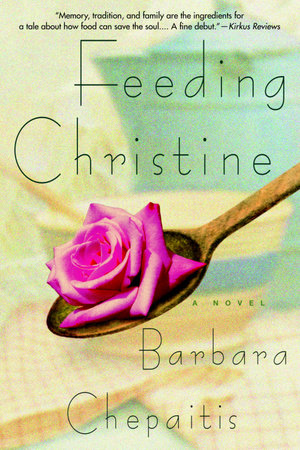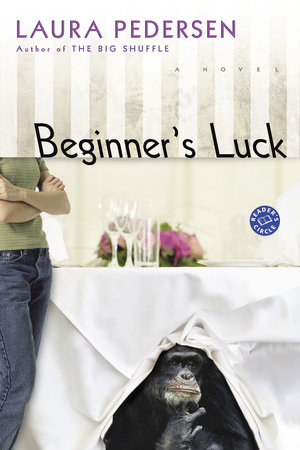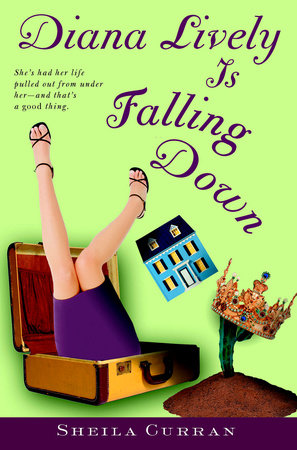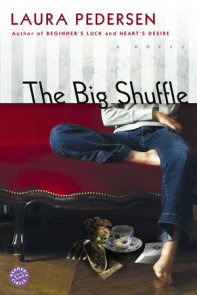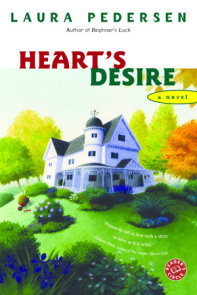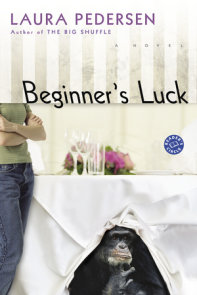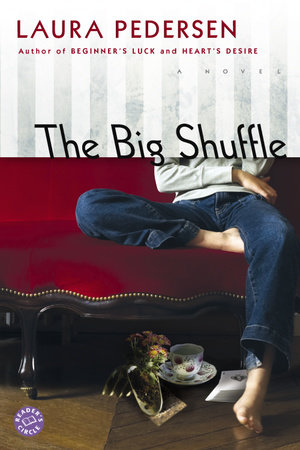Author Q&A
A Conversation with Laura Pedersen
Julie Sciandra and Laura Pedersen have been friends and occasionally colleagues
for more than twenty years. They walk each other’s dogs and also bowl
together. Julie usually wins, but Laura insists that this is because Julie’s family
owned a bowling alley in Buffalo, and thus she has had an unfair advantage.
Julie Sciandra: Did you always want to be a writer?
Laura Pedersen: I was a slow starter, basically a turnip in a sleeper the first
few years of my life, and I didn’t come on strong academically until
much later. Just learning to read was a huge accomplishment for me. I
would say the prospect of telling stories first arose in seventh grade. An
only child and pathologically shy I realized I had to do something to facilitate
interaction. So I started telling a few jokes and funny stories,
and found a positive response that led to friendships. After getting
yelled at for talking during class, I was forced to start writing and passing
notes.
JS: When did you first receive recognition for your writing?
LP: In middle school I won an essay contest for writing about Teddy Roosevelt.
And then I won a prize in the declamation contest for a speech
about Carrie Nation. But it wasn’t until high school that I really hit it
big—I was sentenced to community service for a poem I’d written that
contained a hidden message.
JS: How do you set about writing a novel like Last Call?
LP: I hear a lot of writers say they start with the seed for an idea, such as a
character or one particular event, and they don’t know where it’s going
to lead them. That could never work for me. I don’t start a book unless
I have the beginning and the end. Only the middle is something I can
work out as I go.
JS: Do you write every day?
LP: I definitely write checks every day. But I probably work on what will
eventually become a book or short story about four days a week, usually
between 10:00 a.m. and 3:00 p.m., with an hour break for lunch and a
few other breaks for running errands or playing with the dogs. I have a
very short attention span and work best in spurts, then I need to do
something else for a while, like go Rollerblading or play basketball with
the kids.
JS: How long does it take you to write a book?
LP: That’s a real time-motion study, like how long between when a traffic
light in Manhattan turns green and the cab driver behind you leans on
his horn. But I’d say a book takes me a year, while doing other things. I
suppose that if I sat down with a freezerful of burritos and a vat of
chocolate, I could write a novel in eight weeks.
JS: Where do your ideas come from?
LP: From daily life. I live “hard” in the sense that I enjoy being on the go
and having lots of experiences. For instance, I went to the floor of the
stock exchange shortly after I turned eighteen. That environment created
the foundation for my first book, Play Money. Journalism has taken
me to exotic places like Russia, Turkey, and Cuba. If you want to tell a
story but you don’t have an idea, I think it’s best to go out and do something
and then write about it. There are a lot of things I’d love to do
but haven’t had time yet, and so I’ll occasionally imagine a character
doing them and use that in a novel. But at the end of the day, my stories
are always about living, loving, and dying.
JS: Are the characters based on people you’ve known in real life?
LP: I borrow bits and pieces from different individuals and then create new
people, sort of like a medieval dwarf going from house to house in the
middle of the night and stealing the essences of the townsfolk. For instance,
my friend Peter Heffley’s ninety-year-old mother, Mildred, is
the patron saint of worriers and pessimists. We actually look forward to
her negative pronouncements and often attempt to evoke them just for
entertainment. (Hence the catchphrase, “Who put the dread in Mildred?”)
I know if I say, “My, that’s a lovely orchid, Mrs. Heffley,” she’ll
retort, “It’s just about dead.” Or if Pete says he has the Fourth of July
party all organized, she undoubtedly replies, “There’s a storm heading
this way.” So for the character of Diana in Last Call, who is unlike Mrs.
Heffley in every other way, I borrowed the fretfulness along with some
of her best lines. And many of my charaters are built on a small slice of
me that I then exaggerate. For example, in Beginner’s Luck Hallie plays
poker, goes to the racetrack, and trades in the stock market. Gil likes
plays by Tennessee Williams, Craig is an only child, Olivia is a vegetarian,
and Bernard is optimistic and enjoys humor. Those are all based
on my own experiences or personality. Plus, I’m a lazy researcher.
JS: How does being a minister influence your writing?
LP: I’m an ordained interfaith minister (we respect all paths), but I don’t
have a congregation, and I don’t give sermons, except to the teenaged
Michael. In the not-for-profit world it helps to accomplish things if
you’re a minister or a politician. As for organized religion, I’m a lifelong
Unitarian Universalist. Most Sundays you’ll find me sitting in a pew
on the far right over at All Souls in Manhattan, reflecting on the
UU Trinity—reduce, reuse, and recycle.
JS: But there’s a lot of religion in Last Call, especially Catholicism.
LP: I’ve always had an interest in religion, especially since it’s been the
cause of so many wars and so much strife. Also, my earliest childhood
memory is of my mother yelling, “Jesus Christ, is it ever going to stop
snowing?”
One of my favorite stories is how in the late 1300s there were two
dueling popes, Clement VII and Urban VI, both busily excommunicating
each other. Finally, a council was called to decide between
them. Pietro Pilarghi, who helped bring about the council, made himself
pope and told the others to take a hike. Neither did, and so then
there were three popes.
As for making Rosamond a Catholic, when I was growing up outside
of Buffalo in the 1970s, eighty percent of the population was Catholic.
As James Joyce famously said about his faith, Catholicism means “Here
comes everybody!” Catholics live out loud in a terrific way. So every-
where you turned there was a big church, battalions of habited nuns,
outdoor celebrations on feast days, and of course the Friday fish fry.
(Word of the Vatican II council that ended in 1965 apparently
hadn’t yet reached Buffalo. Cowboy comedian Will Rogers once explained
that he wanted to be in Buffalo when the world ended because
it would happen there five years later.) So my friends were constantly
dashing off to Mass, confession, religious instruction, and CYO (Catholic
Youth Organization). Having had so much exposure to that particular
faith, I thought it would be interesting to set up a sort of fictional showdown
between an atheist and a Roman Catholic. Also, if Rosie had
been a Theosophist, I don’t think the story would work as well because
there aren’t the lifestyle constraints and concept of an afterlife to work
with. And worse, I would have had to do research.
JS: I notice you have a pair of snazzy new red-and-blue bowling shoes. Is
there a big game tonight?
LP: Not tonight, but I haven’t given up on my idea of bringing about world
peace through bowling. It’s a sport that allows almost everyone to play,
regardless of race, religion, economic background, and body type. You
can wear a sombrero, burka, kilt, saffron robe, or whatever you like.
JS: So what’s next? I’ve seen you scribbling on your jeans, which usually
means a new book is in the works.
LP: After Beginner’s Luck came out people asked, “What happens to Hallie?”
It was open-ended, so I’ve written a sequel called Heart’s Desire.
Hallie has finished her first year away at college and returns to the
Stockton household for the summer, which is in a greater state of chaos
than usual, if that’s possible. Gil and Bernard have broken up, and Ottavio
is pressuring Olivia to marry him. Meanwhile, Hallie is contemplating
that age-old teenage dilemma: Should she or shouldn’t she?
